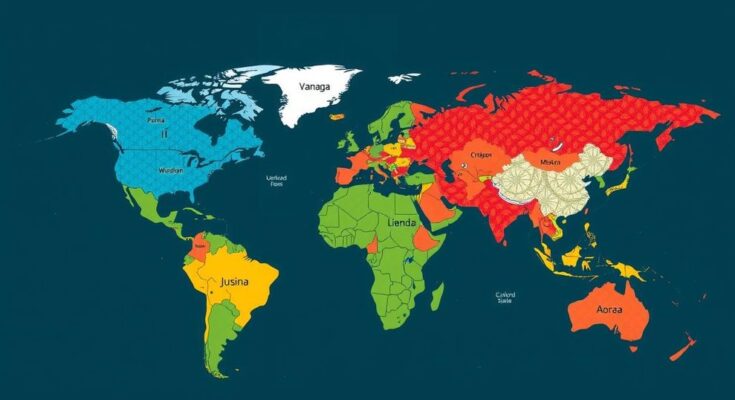Climate change poses a severe global threat, yet a majority of scientific literature is published in English, limiting accessibility for many. With approximately 90% of scientific articles in English and only 25% of the global population speaking the language, a significant knowledge gap exists. This linguistic inequality exacerbates existing disparities in climate knowledge production, as developing nations disproportionately affected by climate change often lack access to relevant research. Initiatives like UNESCO’s Open Science and translation efforts by Climate Cardinals aim to break down these barriers, promoting multilingualism to enhance climate literacy and foster inclusive action against climate change.
Climate change represents one of the gravest challenges facing humanity today, manifesting in rising global temperatures that impact everyone on Earth. Despite the gravity of this issue, a considerable portion of scientific literature concerning climate change is published exclusively in English, arguably the world’s predominant language. This situation creates a paradox: while English serves as the primary medium for scientific discourse, it simultaneously restricts accessibility for a majority of the global population. Statistical evidence highlights this linguistic disparity, as approximately 90% of scientific publications are disseminated in English—a figure underscoring the overwhelming dominance of this single language. However, English is a language spoken natively by merely a fraction of the global populace. Predominantly spoken in a limited number of countries, including the United Kingdom, United States, Canada, Australia, and New Zealand, the total population of native English speakers hovers around 400 million, representing only a small minority in a world exceeding 8 billion individuals. In several countries, particularly those with colonial histories, English exists in a context alongside other languages, often viewed as a language of the elite or a requisite mode of communication among the urban middle class. Linguist David Crystal approximated that the number of English speakers worldwide might range between 1 and 2 billion. Even at the higher end of this estimate, only 25% of the global population communicates in English, indicating that a substantial three-quarters remain excluded from critical scientific discussions surrounding climate change. The linguistic inequality inherent in this landscape contributes to an imbalance in scientific knowledge dissemination, particularly regarding climate change research, which is predominantly generated in the United States and the United Kingdom. Out of the leading 100 scientific journals, an overwhelming 91 are based in these two Anglophone nations, further entrenching the barriers faced by non-English speaking populations. This exclusion severely impacts individuals in developing nations who disproportionately face the adverse effects of climate change, as they often lack the necessary access to relevant scientific literature written in a language they comprehend. Addressing this pressing issue requires concerted efforts, such as those initiated by UNESCO’s Open Science initiative, which seeks to democratize scientific knowledge. This program aims to make scientific research accessible to all individuals, transcending linguistic and geographical barriers. Promoting multilingualism among researchers is one strategy to combat English monolingualism, ensuring that scientific findings can be communicated effectively in various languages. Additionally, leveraging advancements in machine translation technology can facilitate wider access to climate information. This is evident in the endeavors of organizations like Climate Cardinals, whose mission is to translate climate-related information into over 100 languages, thereby enhancing accessibility and participation in climate action. These initiatives reflect a hopeful trajectory towards improving climate literacy and fostering effective responses to mitigate the adverse effects of climate change, ensuring inclusivity in environmental discourse and action.
The phenomenon of climate change has garnered significant attention as one of the most substantial threats to humanity, necessitating a comprehensive understanding among diverse populations worldwide. However, access to relevant scientific literature is limited, particularly for those who do not speak English—the primary language of approximately 90% of scientific publications. As a result, a vast portion of the global populace remains uninformed about critical scientific findings and discussions related to climate change. This situation highlights the need for increased representation of indigenous and non-English languages in scientific communication, thereby addressing the inherent inequalities in knowledge production and distribution. The emergence of initiatives like UNESCO’s Open Science and organizations such as Climate Cardinals signifies an urgent attempt to bridge these gaps and enhance climate literacy globally.
In summary, the linguistic barriers imposed by the predominance of English in scientific literature significantly hinder global climate literacy, particularly among populations most vulnerable to climate change. The current disparity not only limits accessibility to crucial information but also perpetuates broader systemic inequalities within scientific discourse. However, through initiatives aimed at promoting multilingualism and employing advanced translation technologies, there exists a promising avenue for enhancing inclusivity in climate science communications. Such efforts are essential in ensuring that climate knowledge is accessible to all, fostering informed action to combat the ever-pressing crisis of climate change.
Original Source: theconversation.com




